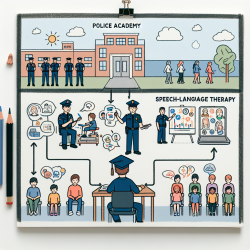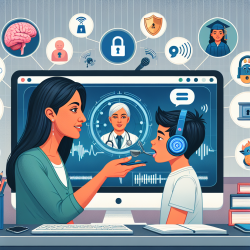Introduction
In the evolving landscape of online therapy services, particularly for children, it is crucial to integrate data-driven insights to enhance outcomes. A fascinating parallel can be drawn from the recent research on police academy training, which emphasizes the integration of psychological skills to meet contemporary challenges. This blog explores how these insights can be applied to improve online therapy practices.
Understanding the Research
The research article "New Directions in Police Academy Training: A Call to Action" highlights the importance of incorporating cognitive, emotional, social, and moral skills into police training. These skills are not only vital for the wellness of officers but also enhance their interactions with the community. This holistic approach can be adapted to online therapy services, particularly for children, to foster better therapeutic outcomes.
Applying Cognitive Skills in Therapy
Just as cognitive skills like decision-making and adaptability are crucial for police officers, they are equally important in therapy settings. Online therapists can enhance their decision-making processes by utilizing data analytics to tailor interventions to each child's unique needs. This approach ensures that therapy is not only effective but also responsive to the child's progress.
Emotional Skills: A Core Component
Emotional regulation and intelligence are highlighted in the research as critical for police officers. Similarly, online therapists must cultivate these skills to manage the emotional dynamics of virtual sessions. By maintaining composure and empathy, therapists can create a supportive environment that encourages children to express themselves freely.
Enhancing Social Skills in Online Therapy
Social competence and teamwork are essential for police officers to build community relations. In online therapy, these skills translate into building a strong rapport with children and their families. By fostering open communication and collaboration, therapists can engage families in the therapeutic process, ensuring that interventions are reinforced at home.
Moral Skills: Upholding Integrity
The research emphasizes integrity and ethics as foundational for police work. For online therapists, maintaining high ethical standards is paramount, especially in digital interactions. Adhering to confidentiality, informed consent, and professional boundaries ensures trust and safety in the therapeutic relationship.
Conclusion: A Call to Action
The insights from police academy training research offer valuable lessons for enhancing online therapy services. By integrating cognitive, emotional, social, and moral skills into therapy practices, therapists can improve outcomes for children. This holistic approach not only addresses the immediate needs of therapy but also contributes to the long-term well-being of children.
To read the original research paper, please follow this link: New Directions in Police Academy Training: A Call to Action.










